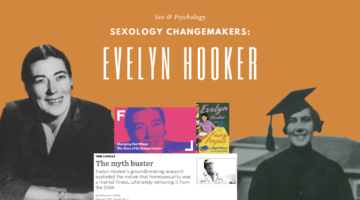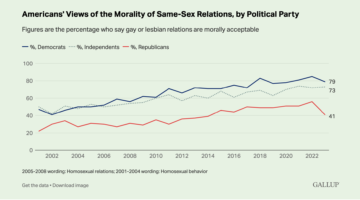Why Was There So Much Gay Sex At The RNC? A Social Psychologist Explains
July 27, 2016 by Justin Lehmiller
At last week’s Republican National Convention (RNC) in Cleveland, reports are that a lot of sex was going on behind the scenes—a lot of gay sex to be precise. For example, during the convention, usage of the all-male hookup app Grindr was more than twice as high as usual in the Cleveland area. But it wasn’t just that—male escorts in the Cleveland area also reported booming business for the week.
Media outlets were quick to point out the irony, considering that this year’s Republican party platform is unabashedly anti-gay, with the Log Cabin Republicans (the gay branch of the party) going as far as to call it the “most anti-LGBT…in the Party’s 162-year history.”
While all of this is certainly interesting, what I found to be missing in all the media reports coming out was a look at why—why would so many gay and bisexual people attend a political convention for a party that formally opposes so many LGBT causes?
Social psychological research can offer a few insights.
I should start by saying that psychologists have corroborated the idea that homophobic people sometimes harbor their own same-sex desires—that’s nothing new. In fact, in a 1996 study in which researchers showed different types of porn to homophobic and non-homophobic men, they found that only the homophobic men exhibited increased genital arousal in response to a video of two men having sex [1].
So what are the roots of this hypocrisy? Some research suggests that it might be a product of growing up with authoritarian parents who discourage independence [2]. You can read my full summary of this line of research here, but the basic idea is this: when parents are extremely controlling of their children’s beliefs and behaviors and make their love contingent upon whether their children live up to certain standards, those children can end up acting in a way that’s consistent with their parents’ desires, even though it doesn’t necessarily reflect their own personal desires.
Put another way, when a person feels a lot of outward pressure to be homophobic from their parents, they might strive to repress or deny their true sexual orientation in order to earn their parents’ love.
Of course, this isn’t the only possible explanation for why some people who have same-sex attractions might support anti-gay political parties or causes. For others, it might have less to do with parenting styles and more to do with very strongly held religious beliefs that are incompatible with homosexuality.
In yet other cases, there might be some cognitive dissonance at play, which occurs when people hold two contradictory beliefs at the same time or hold beliefs that conflict with their behaviors. This theory argues that we are motivated to resolve such inconsistencies when we become aware of them because they create psychological discomfort.
There are a lot of different ways people can resolve cognitive inconsistencies, such as by changing their beliefs in order to justify them. For example, in the case of someone who is LGBT and Republican, they might rationalize the inconsistency with thoughts such as “the party platform doesn’t mean anything anyway.”
Bottom line: There are several fascinating psychological theories that can help to explain why persons with same-sex attractions and desires sometimes support political parties that seemingly don’t align with their own personal interests. Keep in mind that this phenomenon likely has multiple causes (as most things in psychology do), so it’s not necessarily the case that only one of these theories is correct and that the others are wrong–each may explain how different people end up arriving at the same place.
Want to learn more about Sex and Psychology ? Click here for previous articles or follow the blog on Facebook (facebook.com/psychologyofsex), Twitter (@JustinLehmiller), or Reddit (reddit.com/r/psychologyofsex) to receive updates.
[1] Adams, H. E., Wright, L. W., & Lohr, B. A. (1996). Is homophobia associated with homosexual arousal? Journal of Abnormal Psychology, 105(3), 440-445.
[2] Weinstein, N., Ryan, W. S., DeHaan, C. R., Przybylski, A. K., & Legate, N. (2012). Parental autonomy support and discrepancies between implicit and explicit sexual identities: Dynamics of self-acceptance and defense. Journal of Personality and Social Psychology, 102, 815-832.
Image Source: 123RF.com/ukususha
You Might Also Like:

Dr. Justin Lehmiller
Founder & Owner of Sex and PsychologyDr. Justin Lehmiller is a social psychologist and Research Fellow at The Kinsey Institute. He runs the Sex and Psychology blog and podcast and is author of the popular book Tell Me What You Want. Dr. Lehmiller is an award-winning educator, and a prolific researcher who has published more than 50 academic works.
Read full bio >


